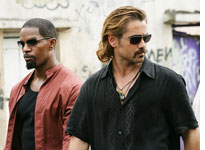Mojito Coast
Surrendering to the charms of Miami Vice.
Listen to Dana Stevens' Spoiler Special about Miami Vice by clicking the arrow on the player below:
It's a measure of Michael Mann's unique gift as a filmmaker that he manages to make stuff you'd never want to do in real life—like grinding against Colin Farrell in a sweaty nightclub, or exchanging gunfire with Nazi supremacists in a trailer park—seem strangely seductive and appealing. The world according to Mann is loud, dangerous, morally ambiguous, and more than a little greasy, but during the hours you spend there, there's nowhere you'd rather be.
This is true even in films like Collateral (2004), in which Mann's storytelling disintegrates into a whirl of stylized set pieces. Collateral's last 20 or so minutes are downright ludicrous, but the impression you take away from it is still of a place—in Collateral's case, Los Angeles—that's serious, sophisticated, and somehow fully adult. In Miami Vice (Universal), the nightscapes of L.A. are replaced by a transnational Mann-land: Whether you're in Miami, Havana, or a lawless frontier city straddling the borders of Paraguay, Argentina, and Brazil, there's no shortage of stark-white apartments with spectacular ocean views, where gorgeous biracial women take long hot showers as R&B throbs in the background.
Lest this all start to sound campy, let's be clear: In returning to his own Miami Vice series for source material, Mann isn't mining the vein of '70s and '80s TV nostalgia that brought us movie versions of Starsky and Hutch, Charlie's Angels, and The Brady Bunch. If anything, it's the TV show, with its garish costumes and winking dialogue, that feels like a sendup, while the far grittier and darker film functions as the real thing. Mann treats the bygone series not as a brand but as a myth. He uses our background knowledge of it as shorthand, the better to hurl us in medias res.
Where we're hurled turns out to be a pretty murky place indeed. After the identity of an informant (John Hawkes) is leaked and his family brutally killed, detectives Sonny Crockett (Farrell) and Ricardo Tubbs (Jamie Foxx) go deep undercover to sniff out the rat. This leads them in two directions at once: on the trail of a Cuban drug lord named Arcángel Jésus de Montoya (Luis Tosar) and into the dank, depressing world of an American white-supremacist group that, for reasons Mann never quite makes clear, have seen fit to kidnap Tubbs' girlfriend Trudy (Naomie Harris), an ass-kicking intel analyst. Meanwhile, Crockett is falling hard for Montoya's woman, a poker-faced Chinese-Cuban beauty named Isabella (Gong Li). In the movie's most exhilarating scene, she invites Crockett to take her out for a mojito—to Havana. As they skim across the Florida straits in what's referred to, with good reason, as a "go-fast boat," the viewer is drawn in by one of the oldest and most compelling reasons there is to go the movies: We'd like to be doing that, too—zipping off to Cuba for a no-strings night of passion with the likes of Gong Li—and this is as close as we're ever gonna get.
Verbally, Gong Li's performance is something of a disaster. She pronounces her English dialogue phonetically, with a singsong intonation unrelated to its content. But Li's face communicates affect with the economy of a silent-film actress. Sonny and Isabella's romance, as scripted, is a pretty thin affair, but somehow by the movie's end I believed in their grand passion for each other. Colin Farrell, who was laughably insubstantial as Alexander the Great in Oliver Stone's Alexander, brings a deep, if inscrutable, back story to his portrayal of Sonny Crockett, a man willing to suspend the law in order to enforce it. Jamie Foxx, wearing an oddly pubic tuft of chin hair, seems uncharacteristically restrained as the more by-the-book Tubbs. He does get one down-and-dirty love scene with the missus, but I would have liked to see him take off on a go-fast adventure of his own.
The movie's languid, world-weary mood is punctuated rhythmically by earsplitting bursts of gory violence—it's as if Sam Peckinpah had retired to Margaritaville. And while my viewing companion and I occasionally snickered at the existential bravado of the dialogue ("It is eleven forty-seven o'clock, and this is the hand we have been dealt"), we sobered up quick when the guts started to hit the fan. But for all its abundant gunplay, Miami Vice is not without its moral center. "There's undercover," Tubbs warns his partner as Crockett begins to fall under Isabella's spell, "and then there's, which way is up?" In Mann-land, these distinctions—between right and wrong, cop and criminal, the world and the netherworld—matter, big-time. At the risk of getting all existential myself, they're all we've got to separate us from savagery.

